Small Defeats is a short story by Jamal Al-Qawasmi, a Palestinian writer from Jerusalem. Al-Qawasmi’s writing is marked by a profound depth of insight into the condition of people looking for their existential identity while “falling in a hole”. A hole made of silence and confusion.
As he stepped out into the street, his town, AI Ram, was choking him. He was watching his city for the millionth time: Swollen concrete buildings, swirling dust, streets full of holes that swallow people and cars, and become swamps in winter, surrounded by trees of oblivion and carelessness.
For two days he had hidden from the street, skulking at home trying to forget this rejected city which squirms at the foot of Jerusalem, the same Jerusalem which has been far from his eyes and forbidden.
Until recently he had felt everyday that he was seeing Al Ram for the first time, but now his pain opened wide in a silence nobody could explain as he cursed the day nine years ago when he left Jerusalem and hired a house in AI Ram.
If you fell in a hole in AI Ram it would be no use crying for help, nobody would answer. Every body in Al Ram is falling in a hole of his own, and calling for help into a deafening silence.
His wife followed him out of the house crying, ”Please, Salem , don’t go. I can understand now that we are different, but I am your wife and you are my husband.”
-” Inas’ he said, ”Please understand my attitude. I am another person now, Al Ram is not AI Ram, and you are not yourself.”
A long silence extended between them, an infinite distance of loss and sorrow. She tried to snatch an envelope from his hand, but he walked away through people who were staring at him with boredom and disappointment. She tried to follow him and he stopped so suddenly that she bumped into him.
-” Please, leave me,” he said, ”I can’t bear myself. For ten years I have been fooled by you, by my mother and my house, and the most painful thing is that I have fooled myself. Why don’t you believe me? I have to resign.”
She let him go. He jumped in to the first car heading to Ramallah. He couldn’t endure Al Ram. He was forbidden from entering Jerusalem, thus he would spend all day long in Ramallah. He reached the newspaper early, even before the receptionist, the accountant and the administrator. He sat down in a stupor, like a corpse chewing on a silence nobody can explain.
People stared in on him while passing’ to and fro. He could see the administrator shouting at the secretaries or down the phone saying, ”We need more ads. Look at the other newspapers. I want you to bring these advertisements to our newspaper right now. How many times do I have to tell you that advertisements is the key to professional journalism?”
Salem was watching the secretaries tapping the buttons of the computers when suddenly he was startled by a harsh and scabby voice, ”What are you doing just sitting there?’ it asked. Maybe he was the editor or the owner of the paper. Salem said nothing. He couldn’t do anything. The scabby face looked over all the employees with the same questions in his eyes. The receptionist said: ”He’s been there since the morning, just sitting there with a strange envelope.’
The man stared at him again and quickly found him funny. He asked, laughing, ”What does he want then?”
The accountant answered, ”He wants to see you.”
-” Well, bring him in,” the administrator or editor said.
Salem felt comfortable inside the office. There was a photograph of New York City at night with skyscrapers windows glittering. He studied some of these windows but couldn’t spot a human shadow. He felt the editor pat his back. He left New York immediately, and drowning in a glinting swamp of darkness he was back in Ramallah.
-” I am every thing here,” the man said, ”The owner and every thing you want. But before we go on, what would you like to drink, coffee or tea?”
-” Nothing. I can’t handle such a situation,” he said, blowing with anger, and he placed his envelope on the table in front of the editor.
-” At least, sit down.”
-” I have no time. I’ve been waiting for you since morning; I am tired of sitting.”
-” Why are you so angry?” asked the editor and took the envelope. He opened it and read it twice, intently: ‘I am Salem Abdul Rahman, and I humbly ask you to approve on my re…’ What’s this?”
-” My resignation.”
-” From what?”
-” Oh! What do you think? From Al Ram? From my body? From my tribe? From my job of course!”
-” No need to shout, please. Don’t give me the impression that I am unfair and you are the victim whose rights I have wrongly claimed. I am on your side and I want to be your friend. I don’t know why I like you, but I have to feel at least that we can be friends. Believe me.”
-” But I am not going to withdraw my resignation. I am not able to work here anymore.”
-” But you do not work here!”
Each of them stared at the other. Salem rubbed the sweat from his forehead, and pushed back his fine black hair.
-” In spite of this, I want to resign.”
-” Do whatever you like, but I am not going to accept your resignation.”
-” Damn it. Why not? I don’t want just to fill spaces. I write with my blood, my nerves and my pain. Every thing I write or translate for your newspaper is nothing but to fill spaces. Your paper takes in my soul and print out nothing but shit everyday. All that I write is lies. We brainwash the people. We sell them fancies. We deceive them. I can’t bear this bleeding, my head is dizzy and my feet hurt.” He began to weep and fell on the chair, a stupid corpse chewing on a silence nobody can explain.
-” Why don’t you drink something? Tea?” the editor asked. He nodded in approval. ”Have you eaten anything since morning?”
He shook his head in denial.
-” We are going soon to eat together, but I think that you need something more than food or drink. Do you know what is it?’
-” Shoes!’
-” You really need shoes. I’ve just noticed that you’re not wearing any. Listen to me. Listen well. Forget your resignation; fill out a new job application and you will get a job in which you are not going to write anything that the paper will just chew and discard. Oh God! Have your own space. Write whiteness. Write blackness, in any meaningless way, and as much as you like. Write whatever you want. You are a genius. Surely you love football.”
-” No, jogging.”
-” So your feet are bleeding?”
-” No, my feet are bleeding because I couldn’t find my shoes in my house this morning.”
-” How were they lost?”
-” Please, do not embarrass me.”
-”Tell me!”
-” It is an uneasy secretl.”
-” Come on. Spell it out.”
-” Please!”
The secretary brought a tray with a sugar bowl, a spoon, two glasses of water and tea with a slice of lemon. He thanked her and sipped it eagerly.
-” For God’s sake, tell me the secret,” said the editor.
The man said. ‘I woke up this morning with a strange sensation. I was woken up by the caresses and kisses of my wife, as if she was saying the last farewell to me. I told her that I would be absent for eight hours only and return home to her and the children. We had good time and took a shower together. I shaved, cut my nails, washed my under wear – a habit I learned while studying abroad – then put on a suit of my size I didn’t know where it came from. I haven’t seen it before. I didn’t buy it; neither did my wife. I liked it and put it on, then.
I looked for my shoes but didn’t find them. Can you believe that I didn’t find them? Can you believe that I didn’t find my shoes?”
What Salem Abdul Rahman said astonished the editor. As soon as he mentioned the story of the suit, a disbelieving look had passed across his face. Meanwhile the office was crowding with other editors, typists, guards, the accountant, the receptionist, distributors, drivers and all were attentively listening to Salem very well.
-” You didn’t find your shoes?”
-” No, but I found this suit,” said Salem and drank what was remaining of the tea.
-” Then, what happened?”
-” I recognized then that I was not in my house, that that woman whom I have been loving and living with and have argued with for ten long years was not my wife, those children were not mine, I was not myself, and above all I was enjoying a vacation which was not mine.”
The scabby-face editor swallowed a drift of silence and chewed it slowly. This quiet was disturbed and short-livrd. After a while, charged by the glances of the employees, he said, ”How strange! I had the same feeling this morning, but I ignored it and laughed at myself. Really, I felt that I was not me, not the editor in charge, nor the editor in chief, nor the owner of the paper, but that I had been in a house I don’t know.
-” What made you so sure?” asked the secretary.
-” The shoes. I found some shoes in my house that were not mine. I told my wife, ‘this iksn’t mine!’ She laughed, embraced me and kissed me saying, ”Shame on you. Whose shoes then, you jerk?’
‘I swear by God they are not mine!’
‘Come on. Put it on. Don’t be silly!’
”I told her a hundred of times that the shoes were not mine, trying to control my rage, but she went on saying, ‘they are yours; just put them on, you thick-blood!
”I asked my mother and my daughters if they remembered the time we bought the shoes together, and told them that those were not the same shoes. They said nothing. I realized then that those who accompanied me to buy the shoes were not my mother and my daughters, and that I had been deceived by everyone for a long time. Every one of them went to look for their shoes, and they all discovered that they were not themselves. The case is very strange: My wife was not my wife, my mother was not my mother, and my daughters were not my daughters but nobody dared to say anything. There were solid mountains of silence separating all of us. But you taught me to speak the truth. No, I am neither an editor nor nothing. Let me take off my shoes. Leave me, please.”
Salem Abdul Rahman sat absent minded, watching closely the photo of New York. It seemed that he didn’t notice the editor in charge speaking to himself, and didn’t see him take off his shoes, walk through the crowd of employees and leave the building.
All at once the employees had begun together taking off their shoes and had realized that they were not themselves. They all went out to the street, leaving Salem flirting the neutrality of New York, drowning in darkness. He tried to look for a person in the photo, a shadow of a person or something that represents a human being. He saw a human shadow in a window of a high floor of a skyscraper.
He said: ”Hello, Hello, How are you?”
-” Fine!” said a woman, whose only shadow was seen.
-” I discovered today that I am not myself.”
-” This is a disaster. How did it happen?”
-” I didn’t find my shoes at home, so I realized that I had been living for ten years, in a house that is not mine, with a woman who is not mine. I live in a pussy city. I am another person’
-” I can’t hear you.”
-” I say that I live in a pussy city, and that I am another person. I am not myself.”
-” I can’t hear you.”
-” I say that I live in a pussy city, and that I am another person. I am not myself.”
-” I can’t hear you. Please shout louder.”
-” Shit!”
He spat at the little human shadow. A winter storm broke in the sky of New York and washed its loneliness, neutrality and darkness. It stopped being charming and glittering in his eyes as he saw it before. He left the building. He walked in the streets of Ramallah.
The city was the same as he had seen it every day before his vacation, but there were both a strange movement and strange gestures in the bodies of the people and their faces. Salem came near a policeman who took off his shoes and complained about his astonishing discovery: ”Today I found that I am not a policeman and that I am not myself.”
Salem felt exhausted and deadly bored. He left the policeman alone talking to himself, then didn’t pay any attention to all the people who were standing on the sidewalks and the streets, taking off their shoes and talking stupidly. A man in the taxi heading from Almanarah Square to Al Ram said, ”I know that my shoes are not mine, I am not myself and my normal joy today is not mine. Maybe I ought to be sad today. May be I have stolen the joy of another person.”
The driver stopped the taxi in some place. When the passengers except Salem – asked why he pulled over, he replied weeping, ”I discovered this moment that I am not myself, that I have been driving for twenty years in a car that is not mine, and talking to passengers who are not mine. Do you imagine this! The worst thing is: who can guarantee that I am going to the place I ought to go to? Isn’t it possible that I am going to the wrong place? The passengers got out and so did Salem. Many cars had stopped in the middle of the street holding up the traffic, but strangely there were no horns, insults, or fights, at all. Salem walked along car-jammed Jerusalem Road, bored of people’s shallow talk and stupid questions. He felt pain in his bare feet. He cursed his shoes, the paper, the editor in charge, the people, the cars and the main road.
The main road was a clever juggler who knew how to drag him to the AI Ram town by his magic. The crossroad of AI Ram was unusually empty of cars and people. There was a strange atmosphere of ambiguity and silence that nobody could explain. He stopped. He tried to listen. He found his feet carrying him to the military checkpoint that prevents him from entering Jerusalem. Slowly he began to see an Israeli military jeep, military police cars and infantry soldiers. He did not see a single car driven by a Palestinian heading to Jerusalem. He knew that the soldiers would never let Salem himself cross the checkpoint and enter Jerusalem because they had already withdrawn his Jerusalemite identity-card and therefore deprived him from his right to enter Jerusalem.
He saw a jeep crossing the checkpoint. When it stopped, the soldiers got an old man out of the military jeep. The soldiers pushed him and said. ”If you return to Jerusalem we will pull your ears. Do you understand?”
Salem came near the man and asked: ”What is the matter?”
-” In the last hour, something strange happened. Jerusalem became crowded with Palestinians who were streaming in form all over the West Bank, and now there is a big operation to round them up and throw them out.”
-” What happened?”
-” We don’t know how that happened. Soldiers simply took off their boots and came to realize that they were not themselves, that they held weapons that do not belong to them, wore military uniforms not of their own, spoke since child hood a language not theirs, stayed in a place they didn’t know, had feelings of hatred rooted in their hearts and the hearts of Palestinians because of some little wars, wars they didn’t know why they were involved in, and killed people who had never hurt them. The soldiers left the checkpoint, so the people of AI Ram flowed to Jerusalem,” the old man told Salem, who was, wrapped up in a cloud of silence, petrified and deeply sad.
-” What happened to you my son?’ The old man asked, but Salem couldn’t say anything.
He cursed the resignation he wrote, and cursed himself. If he had stayed in Al Ram, he would have been able to slip away to Jerusalem with the others. He spat. He was surprised to find that he was heading to the house which he had realized this morning was not his. Suddenly he fell into a deep hole amid the street and while calling for help from anybody, his wife and children came and rescued him.
-” What are you doing here Inas? Haven’t you gone to Jerusalem?” He asked.
His wife said in kindness and sorrow, ”Your mother and son, whom you realized are not yours, went to Jerusalem but the police caught them and returned them. They are at home now as silent as a stone. As for me, I didn’t want to leave the house and let a man with whom I lived ten years, and realized lately was not my husband, wait for me impatiently.”
He accompanied them to the house. They ate together, drank tea and watched the news. Afterwards everybody went to bed. Once again Salem lay next to Inas. Although she felt that the she was living for ten years with someone who was not her husband, she felt a silent inexplicable motive inside to try to fill the gap between them. She caressed him, embraced him to her bosom and their souls began weeping together in silence. They slept hugging one another, certain of the fact that that they were not themselves, they were in a house not of their own, experiencing orgasms that were not of their own, and that the heavy unbearable silence nobody can explain was not theirs, either.
15-8-1996
translated by: Izzat Ghazzawi

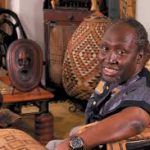
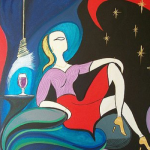
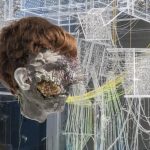
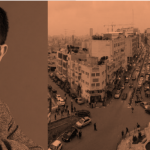

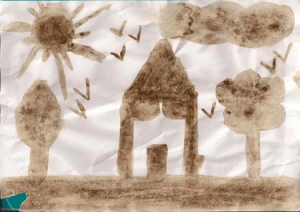
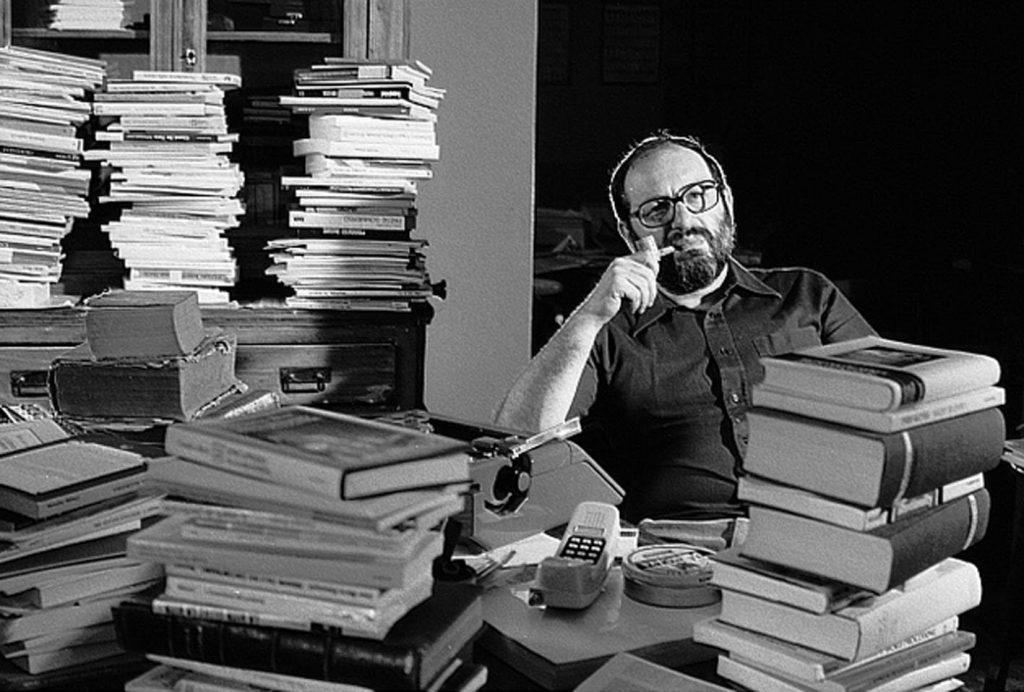
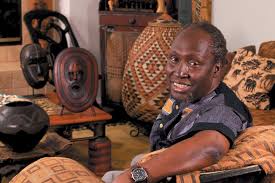
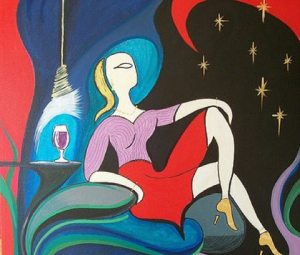
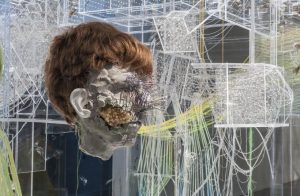
A Moment in Ramallah / John Berger
Orientalism is a cultural and a political fact / Edward Said
Befriending Edward Said